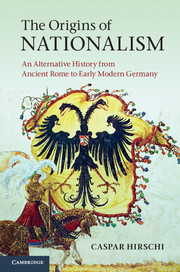Book contents
- Frontmatter
- Contents
- Figures
- Preface
- 1 Introduction
- 2 The modernist paradigm: strengths and weaknesses
- 3 Foundations of a new nationalism theory
- 4 Killing and dying for love: the common fatherland
- 5 Competing for honour: the making of nations in late medieval Europe
- 6 The nationalist transformation of borders and languages
- 7 Humanist nationalism
- 8 A German Emperor for the German people
- 9 Nation and denomination
- 10 Conclusion
- Bibliography of works cited
- Index
2 - The modernist paradigm: strengths and weaknesses
Published online by Cambridge University Press: 05 June 2012
- Frontmatter
- Contents
- Figures
- Preface
- 1 Introduction
- 2 The modernist paradigm: strengths and weaknesses
- 3 Foundations of a new nationalism theory
- 4 Killing and dying for love: the common fatherland
- 5 Competing for honour: the making of nations in late medieval Europe
- 6 The nationalist transformation of borders and languages
- 7 Humanist nationalism
- 8 A German Emperor for the German people
- 9 Nation and denomination
- 10 Conclusion
- Bibliography of works cited
- Index
Summary
Agrarian man can be compared with a natural species which can survive in the natural environment. Industrial man can be compared with an artificially produced or bred species which can no longer breathe effectively in the nature-given atmosphere, but can only function effectively and survive in a new, specially blended and artificially sustained air or medium.
Ernest Gellner, Nations and Nationalism, 1983In fact, all communities larger than primordial villages of face-to-face contact (and perhaps even these) are imagined.
Benedict Anderson, Imagined Communities, 1983The study of nationalism was profoundly reshaped by three publications that appeared independently of each other in 1983: Nations and Nationalism by Ernest Gellner, Imagined Communities by Benedict Anderson and The Invention of Tradition, a collection of essays edited by Eric Hobsbawm and Terence Ranger. These books did not come out of the blue, of course. Gellner and Hobsbawm had been publishing on the subject since the 1960s, and some of their leading arguments had already been introduced earlier by other scholars – Karl Deutsch in the 1950s and Carlton Hayes as far back as the 1920s. Yet, thanks to their critical and commercial success the books marked a watershed and proved most influential for the boom of nationalism studies and the triumph of the modernist paradigm in the following decades.
Although the theoretical discourse on nations and nationalism has significantly broadened and diversified since then, these three works are still regarded as most representative of the modernist approach, followed by other classical studies, such as John Breuilly’s Nationalism and the State and Eric Hobsbawm’s later lectures Nations and Nationalism since 1780. This is why they are to be put at the centre of any critique of the modernist approach. Interestingly enough the books differ strongly both in argument and in content.
- Type
- Chapter
- Information
- The Origins of NationalismAn Alternative History from Ancient Rome to Early Modern Germany, pp. 20 - 33Publisher: Cambridge University PressPrint publication year: 2011



